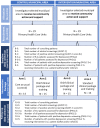Primary care-based screening and management of depression amongst heavy drinking patients: Interim secondary outcomes of a three-country quasi-experimental study in Latin America
- PMID: 34352012
- PMCID: PMC8341512
- DOI: 10.1371/journal.pone.0255594
Primary care-based screening and management of depression amongst heavy drinking patients: Interim secondary outcomes of a three-country quasi-experimental study in Latin America
Abstract
Introduction: Implementation of evidence-based care for heavy drinking and depression remains low in global health systems. We tested the impact of providing community support, training, and clinical packages of varied intensity on depression screening and management for heavy drinking patients in Latin American primary healthcare.
Materials and methods: Quasi-experimental study involving 58 primary healthcare units in Colombia, Mexico and Peru randomized to receive: (1) usual care (control); (2) training using a brief clinical package; (3) community support plus training using a brief clinical package; (4) community support plus training using a standard clinical package. Outcomes were proportion of: (1) heavy drinking patients screened for depression; (2) screen-positive patients receiving appropriate support; (3) all consulting patients screened for depression, irrespective of drinking status.
Results: 550/615 identified heavy drinkers were screened for depression (89.4%). 147/230 patients screening positive for depression received appropriate support (64%). Amongst identified heavy drinkers, adjusting for country, sex, age and provider profession, provision of community support and training had no impact on depression activity rates. Intensity of clinical package also did not affect delivery rates, with comparable performance for brief and standard versions. However, amongst all consulting patients, training providers resulted in significantly higher rates of alcohol measurement and in turn higher depression screening rates; 2.7 times higher compared to those not trained.
Conclusions: Training using a brief clinical package increased depression screening rates in Latin American primary healthcare. It is not possible to determine the effectiveness of community support on depression activity rates due to the impact of COVID-19.
Conflict of interest statement
The authors have declared that no competing interests exist.
Figures
Similar articles
-
Improving the delivery of brief interventions for heavy drinking in primary health care: outcome results of the Optimizing Delivery of Health Care Intervention (ODHIN) five-country cluster randomized factorial trial.Addiction. 2016 Nov;111(11):1935-1945. doi: 10.1111/add.13476. Epub 2016 Jul 25. Addiction. 2016. PMID: 27237081 Clinical Trial.
-
Attitudes and Learning through Practice Are Key to Delivering Brief Interventions for Heavy Drinking in Primary Health Care: Analyses from the ODHIN Five Country Cluster Randomized Factorial Trial.Int J Environ Res Public Health. 2017 Jan 26;14(2):121. doi: 10.3390/ijerph14020121. Int J Environ Res Public Health. 2017. PMID: 28134783 Free PMC article. Clinical Trial.
-
Impact of Training and Municipal Support on Primary Health Care-Based Measurement of Alcohol Consumption in Three Latin American Countries: 5-Month Outcome Results of the Quasi-experimental Randomized SCALA Trial.J Gen Intern Med. 2021 Sep;36(9):2663-2671. doi: 10.1007/s11606-020-06503-9. Epub 2021 Jan 19. J Gen Intern Med. 2021. PMID: 33469752 Free PMC article. Clinical Trial.
-
Screening and brief intervention for alcohol and other abuse.Adolesc Med State Art Rev. 2014 Apr;25(1):126-56. Adolesc Med State Art Rev. 2014. PMID: 25022191 Review.
-
Managing Alcohol Use Disorder in Primary Health Care.Curr Psychiatry Rep. 2017 Sep 14;19(11):79. doi: 10.1007/s11920-017-0837-z. Curr Psychiatry Rep. 2017. PMID: 28905325 Free PMC article. Review.
Cited by
-
Training primary health care providers in Colombia, Mexico and Peru to increase alcohol screening: Mixed-methods process evaluation of implementation strategy.Implement Res Pract. 2022 Jul 15;3:26334895221112693. doi: 10.1177/26334895221112693. eCollection 2022 Jan-Dec. Implement Res Pract. 2022. PMID: 37091075 Free PMC article.
-
Costs of an Alcohol Measurement Intervention in Three Latin American Countries.Int J Environ Res Public Health. 2022 Jan 8;19(2):700. doi: 10.3390/ijerph19020700. Int J Environ Res Public Health. 2022. PMID: 35055522 Free PMC article.
-
Application of the Delphi Method in the Study of Depressive Disorder.Front Psychiatry. 2022 Jul 7;13:925610. doi: 10.3389/fpsyt.2022.925610. eCollection 2022. Front Psychiatry. 2022. PMID: 35873226 Free PMC article. Review.
-
Tailoring an evidence-based clinical intervention and training package for the treatment and prevention of comorbid heavy drinking and depression in middle-income country settings: the development of the SCALA toolkit in Latin America.Glob Health Action. 2022 Dec 31;15(1):2080344. doi: 10.1080/16549716.2022.2080344. Glob Health Action. 2022. PMID: 35867541 Free PMC article.
References
-
- Ferrari AJ, Norman RE, Freedman G, Baxter AJ, Pirkis JE, Harris MG, et al.. The burden attributable to mental and substance use disorders as risk factors for suicide: findings from the Global Burden of Disease Study 2010. PLoS One. 2014;9(4):e91936. doi: 10.1371/journal.pone.0091936 - DOI - PMC - PubMed
Publication types
MeSH terms
Grants and funding
LinkOut - more resources
Full Text Sources
Medical



